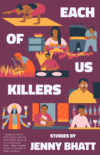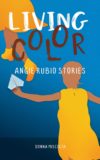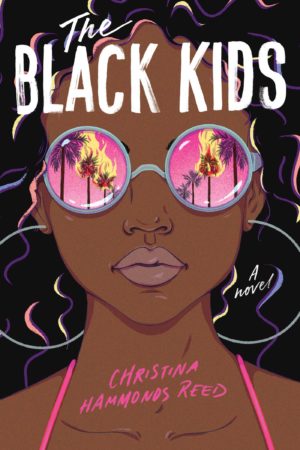The following excerpt is from Half by Sharon Harrigan. Reprinted by permission of the University of Wisconsin Press. © 2020 by the Board of Regents of the University of Wisconsin System. All rights reserved.
Half
Prologue
We wedged Mom between us. Her sharp hips bore into ours as we sat on the hard pew. She nodded toward the blizzard raging on the other side of the stained glass and said, “It’s your dad.”
“He’s making it snow?” As identical twins, we spoke in unison. People responded to us, at least, as if we did.
Mom chewed her index finger and kept quiet. We took that as a yes. Apparently, she was still claiming Dad controlled everything and the weather, even though we had just flown in for his funeral. “Preposterous,” we told each other with our shoulders and palms. Whether we meant the weather part or the funeral part, we didn’t say.
The eulogies droned on. Ms. Rosen, our fourth-grade teacher, swished up to the pulpit, butterfly tattoos sagging under the stretched skin on her now-ample arms, charm bracelet tinkling. She praised Dad and God in the same sentence.
Next came Wild Pete, Dad’s old buddy from his days of leading hunting tours in Alaska, his squirrelly mustache muffling a gruff voice. He told the origin story of Dad’s nickname, Moose. We had heard tales about Pete all our lives but had secretly suspected he wasn’t real.
Our childhood best friends described a man whose beard never grayed, whose shot never missed, who was “always there.” Always where? we asked in an internal voice that sounded more like the snarky teens we had been than the thirty-year-old moms we were now.
We had prepared nothing. Mom could barely stand up, let alone speak, but we, the daughters, should have represented the family. That’s what everyone’s eyes on us said. A young man with a slender purple tie and a square of hair on his flinty chin glared from the other side of the aisle.
Mom sagged against the wooden pew. Her face, already slim from a lifetime of dieting, turned gaunt. Her still-dark hair—so thick that even in middle age she had enough to pile it high, goddess style, on her head—seemed to thin by the minute. A tiny lily tattoo wilted on the back of her neck. Even the beauty mark above her lip shrank.
Our five-year-old sons, clutching plush hedgehogs and snapping their bow ties, sat on our other sides. Next to them, our husbands, lost in an incense fog. Tears would have been a relief, but we dammed them back.
“Marco.” We said it so low it might have been telepathy.
“Polo,” came our reply, barely audible.
We reached over Mom to knock knuckles on each other’s thighs. We fingered the single earring we each wore, a diamond stud. As long as we shared this pair, these secret codes, we thought we couldn’t fall apart.
At the reception, Wild Pete almost tore off our hands, pretending to shake them. Breath thick with chaw, he said, “You’re the ones who killed him.”
We slipped from Pete’s grip, pushed outside, and leaned against the wall near the church basement steps, eyelashes weighted with snow.
“We didn’t,” we said.
Then, “We did.”
“How could he say such a thing?”
“You mean, how could he know?”
We had to hold each other’s coats to keep from falling with the snow. Gusts swirled at our ankles, and snow hooped around our hips. We braced against the scratchy gripping brick.
“Why did we do it?” we asked each other.
“Because of what he did to us. Every year of our lives.”
We couldn’t live with ourselves if we thought we had killed an innocent man. A jury of two, we had to decide if Dad had deserved what we had done to him. The only evidence to review was our childhood.
We clutched each other’s hands for heat, our bodies so close we could imagine we were attached—“Siamese”—the way we had pretended to be so long ago. Spines in fetal curve, we rewound the tape of our lives in our heads, starting back at the age our own boys were now.
“Remember?” we said.
We had never meant to hurt anyone.
**
Chapter 1
We wanted to crawl back in time. Even then. We were only five, but that wasn’t young enough.
The more we played this game—hovering outside our parents’ door after dinner, trying to hear their mysterious bedroom sounds while pretending we didn’t—the more we wanted to be babies again. Or even to slip back into our mother’s belly, the way we slid into her bed those nights when Dad was away on a hunting trip.
“I’m half years old,” we said. “How old are you?”
“I’m half, too.”
At first we meant we had been alive six months, just half a year. Later, half no longer stood for anything. Half empty, half full.
We babbled and baby-talked, the way our own children do now when they don’t want us to understand. Our friend Nevaeh had a baby brother, and he was always sucking at his mother’s breast, so we knew milk was food, milk was love. No one ever said, “Make the baby kiss his own damn boo-boos.” No one gave him boo-boos, either.
We were twin girls, dark bangs cut crooked across our foreheads with the blunt scissors sometimes used for discipline. We listened through the hollow-core door as the mattress squeaked, wondering why our parents were jumping on the bed. They never let us.
We were locked out of the one private room in the house. We wanted to walk in on them now, the way we liked to sneak in on Mom when she tried to escape from us in the bath, slinky and slippery as a mermaid. But even if the door hadn’t been locked, we wouldn’t have dared, not with Dad in there. He was a lion escaped from the zoo. He could hunt us down and eat us in our sleep. He roared, and all his subjects scattered. He was king.
“I’m so little I can’t walk,” we said, floundering on our bellies, flapping our arms.
We said, “I can’t even talk,” then “You’re talking now,” and “No, I’m not. You’re reading my mind.”
As identical twins, we had our own identical language. We understood each other’s taps and scraps of song, our code for “Ignore the sounds behind the door.” We pressed noses to knees, legs bent crisscross applesauce on the dirt-brown shag, which meant: “We can’t do anything to help her, anyway. We’re too little.”
We lay on top of each other, like the puppies we saw at the pet store. Our dog, Rex, had to live outside, and we weren’t allowed to snuggle him in the house the way we were nuzzling each other now. We wanted to buy him a sister or brother from the pound, the way we had once thought our parents bought us from the hospital, two for one, on double-coupon day.
The bouncing on the bed became a pounding beat. It shook the floor and squeaked like something breaking. “Earthquake,” we said. “Quicksand.” We meant “he’s big and she’s small.” She was so thin she could have slipped through the metal bars of a cage. If she wanted to.
We pretended we were in a crib and couldn’t climb out. We made believe we were still at the hospital after being born and there was some hope another family might take us by mistake, the way the cashier sometimes gave Mom the wrong cigarettes at Lucky Seven.
Mom made animal noises on the other side of the door, dog shrieks, worse than our whimpers when Dad punished us for breaking a glass or sharing a secret. We wanted to save her but were stranded on an island the size of this hallway, and if we stepped out we would drown.
We half-wanted to open the door. We leaned into it so we could feel the vibrations of Mom’s cries.
We pressed so hard, our heads pushed the door in, and we fell forward. But no, it was Dad hovering over us, wearing only boxer shorts, his huge hairy hand on the knob. He was on his way to the bathroom. “Kids!” he yelled, stepping on and over us, his bare foot catching our footed pajamas, “Get to bed!”
To Mom he said, “Don’t you teach these girls about privacy? What about manners?”
We could see through the legs of his boxer shorts as we lay on the floor facing up. “It’s not her fault,” we almost said. We didn’t want him to make her squeal again with what we couldn’t have imagined was pleasure. But we didn’t talk back.
Mom pulled the covers over her naked breasts. She flicked her fingers to shoo us away, so we scampered off to our room.
“No fair! Daddy gets milk,” we said to each other after crawling into our twin beds and pulling rubber ducky blankets up to our chins. “Milk is for babies!”
We dreamed a kiss on our foreheads, and, like magic, Mom appeared between us, dressed again in her T-shirt and jeans. “Good night, sweets!” she said.
“Why were you naked?” What we wouldn’t say, what we didn’t dare, was, “What did he do to make you scream?”
“Your dad likes me that way,” she said, turning red. She seemed unhurt, not like Rex when he had made the same sounds she had made in bed.
“We like you that way, too,” we said, and stretched our arms to pull her under the covers.
“You’re way too old for that.” She tore herself from us, far out of reach. “You’re my two big kids. My two eyes and ears. My too, too much.”
We could see her breasts shining through her T-shirt as bright as the moon in the dark of our room. We imagined her nursing us as we lay in the crook of each arm, safe on her lap, skin touching skin.
“Enough.” And when she pressed a finger over her lips, Dad appeared like a ghost in the doorway.
“Why are you babying them?” he said. Then they vanished, the room dark and quiet till we heard their bedroom door close again.
“Why does the sun rise every morning?” we asked.
We answered in a fake Mom voice: “Because your dad likes it that way.”
“Why does it get so cold every winter we freeze our butts off?”
“Because our butts are too big?”
“No, because your dad likes it that way.”
“Why is the sky blue? Why does the devil have horns? Why does fire burn?”
“Because your dad likes it that way.”
We spread our palms on our foreheads, over Mom’s kiss so it seeped through our skin to those places—in our ribs or hips, ears or thighs—where Dad had kicked us on the floor. Our pale skin would swell like purple gumdrops the next day, and Mom would say, “No short shorts for you,” worried the neighbors wouldn’t believe we fell off the bed or bumped into the furniture again.
Dad’s words echoed in our heads: “Why do you make me teach you the same lesson over and over again? Why didn’t you go to bed after dinner like I told you to?”
We couldn’t answer why we didn’t learn our lessons. Why we didn’t pick up dirty clothes, why we forgot to call him sir. Why did deer run into traffic? Bugs fly into light bulbs?
We lay in the beds we had made for ourselves, half awake, half asleep. Half innocent, half guilty, half understanding everything he said.
**
Sharon Harrigan is the author of the new novel Half. In a starred review Booklist said, “Fans of Jeffrey Eugenides, Andre Dubus III, and Jane Smiley will adore Harrigan’s suspenseful, lyrical, and consuming exploration of two difficult lives, intertwined… Raw and powerful, Half will stay with you.” Publisher’s Weekly said, “Harrigan’s bold stylistic choices and memorable voice lend the novel a sense of mystery and magic, well suited to the themes of childhood fears and adult disillusionment. Riveting and inventive, this is a cut above the average coming of age tale.” Foreword Reviews called Half “gripping” and New York Journal of Books calls Half’s point of view “astonishingly effective.” Sharon is also the author of the memoir Playing with Dynamite. She teaches at WriterHouse in Charlottesville, Virginia, where she lives with her family.
**
Music by Catlofe
Sharon Harrigan Sharon Harrigan Sharon Harrigan Sharon Harrigan Sharon Harrigan Sharon Harrigan Sharon Harrigan Sharon Harrigan Sharon Harrigan Sharon Harrigan







